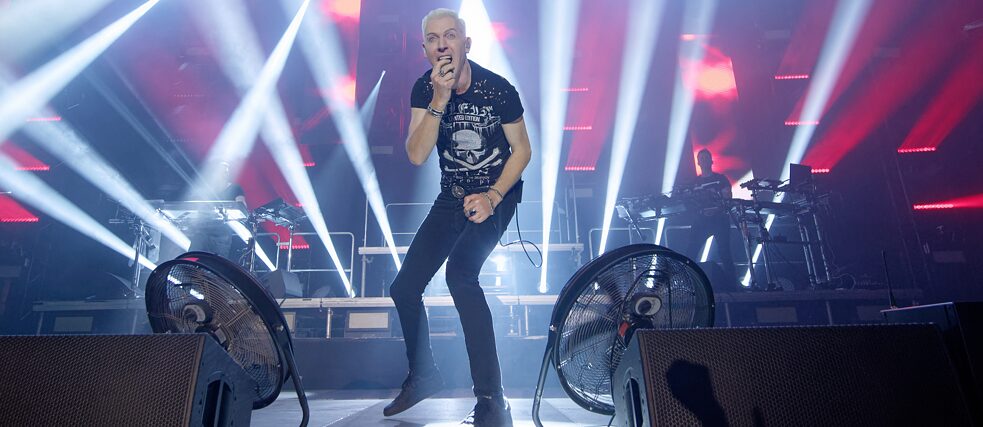SoundBites
Between Funfair Techno and Avant-Garde

Scooter is a major export success with their brutally simple techno beats and German-intoned Dadaist lyrics. For years, the only country the band hadn’t cracked was the US – until a song about a fish appeared on a late-night show.
By Sonja Eismann
In May 2016, US late-night talk show host Jimmy Fallon paid tribute to the German band Scooter, often credited as the inventors of “funfair techno”, by mentioning them on his Tonight Show. Rather than lauding one of Germany’s most enduring and internationally acclaimed pop acts, though, there was laughter and a thumbs-down, and the 1998 hit How Much Is the Fish? landed in his infamous "Do Not Play-List". Fallon exchanged amused and incredulous glances with rapper Questlove at the absurdity of the title, pronouncing the band name with a deliberately Germanic accent. After the show, however, an outpouring of support from Scooter fans forced Fallon to make a swift riposte. He apologised via video message for his 20-year-late reaction to the track title, humorously asking singer H.P. Baxxter how much the fish had actually cost – to which the latter jovially replied in a video clip from the party island of Ibiza: “DM 3.80”.
The entertainer’s reaction is symptomatic of the band’s treatment over the years. Since forming in 1993, Scooter have featured in numerous lists of the world’s dullest, most-reviled bands (alongside Modern Talking – another major German export). Yet, despite their reputation, the band has enjoyed popularity not just with the public, having sold more than 30 million albums, they have also garnered growing acclaim from the critics. The US AllMusic Guide praises the “German rave machine” as the “embodiment of dance music in its most excessive form”. Others are captivated by the hyper-ironic exaggerations – the extreme pace of their relentlessly synthetic-sounding beats, their larger-than-life stage presence (How Much Is the Fish? was actually written for the 1998 World Cup) or Dadaesque lyrics like “Hyper! Hyper! Hyper!”, “Sit there, be good, bye-bye!” or “It’s not a bird, it’s not a plane. It must be Dave who’s on the train”. With his platinum blonde hair, distinctly German accent and sometimes brutish appearance, H.P. Baxxter overtly plays with Teutonic stereotypes, too, prompting many to interpret his persona as a form of self-parody.
Hold your back for the rhythym attack
Coming down on the floor like a maniac
Hold your track so clean up the dish
By the way: How much is the fish?
How Much Is the Fish? might seem like just another formulaic happy-hardcore anthem for the next party frenzy, but beneath the surface are some far more intriguing pop ramifications. The song’s distinctive melody, for example, was taken from a song that caused a stir in the German peace movement in the early 1980s. The writers of the song, the socially conscious Dutch band Bots, also gained recognition in Germany after performing also gained recognition in Germany after performing at Frankfurt’s Rock gegen Rechts (Rock against the far right) festival in 1979. The lyrics of the songs that ended up on their 1980 album Aufstehn (Stand Up) were translated by leading lights such as Wolf Biermann, Hannes Wader and Günther Wallraff. Atmospherically, the Breton folk song-inspired Sieben Tage lang (Seven days long), which promotes solidarity against exploitation, could not be further removed from the Scooter sound.
The inspiration for the absurd song title is surprising, too, and doesn’t fit the cliché of the mindless mega-disco sound. With their song Buffalo, English-Irish post-punk experimentalists Stump made it onto the holy grail of the new British music scene: the C86, a cassette compilation released by the New Musical Express in 1986. Instead of refrains, singer Mick Lynch yells “How much is the fish?” into the mic – to the accompaniment of some inventively weird guitar and bass sounds – laying the foundation for Scooter’s international hit, which is still played today. Stump’s only album was produced by German new wave musician Holger Hiller (Palais Schaumburg), who, in turn, produced singles with Scooter samples for a 2011 art project with painter Albert Oehlen. In an interview with Frieze magazine, he said: “I think I’ve improved the music significantly. Sadly, they’ll probably never ask me for a remix.” But he can’t be so sure about that, because H. P. Baxxter, who was inspired by British concept pop band The KLF to form his own band and enjoys reading Thomas Bernhard in his spare time, is still a fan of New Wave even today. In his own words, he rejects commercialism and conformity. So the game of ambivalence continues, with or without fish for DM 3.80.